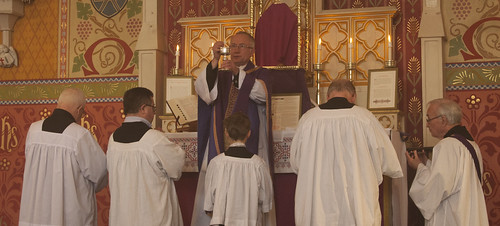 |
| Another photo of the Sung Mass last Sunday, Passion Sunday, at Holy Trinity, Hethe. |
Thus, the claim is sometimes made that some or all of the Gospels are anti-Semitic, on the grounds of passages such as the cry of the crowd to Pilate, condemning Christ: 'His blood be on us and on our children' (Matthew 27:25). In his commentary on this verse, Pope Benedict points out that being sprinkled with Christ's blood has a very different meaning, for Christians, than acquiring blood guilt (Jesus of Nazareth: Holy Week, p187). Pope Benedict refers, like St Thomas Aquinas in his own commentary on the passage, to the Letter to the Hebrews, contrasting the effects of the blood of Christ with that of the murdered Abel (Heb 12:24). I was reminded of this last Sunday, in the Extraordinary Form, when we heard an earlier passage from Hebrews (9:13f):
For if the blood of bulls and of goats, and the ashes of an heifer sprinkling the unclean, sanctifieth to the purifying of the flesh: How much more shall the blood of Christ, who through the eternal Spirit offered himself without spot to God, purge your conscience from dead works to serve the living God?
This observation turns any possible anti-Semitic usage of the text on its head, revealing a completely different way of looking at it. Whatever the crowd meant, and whoever the crowd actually comprised (as Benedict points out, the Chief Priests and a Zealot rent-a-mob wanting to free Barabas), the cry does have a mystical and enduring significance, like the saying of the Chief Priest that 'one man should die for the people' (John 11:50), and this is not something we need to hide from.
By contrast, when the claim is made that St Paul (eg in Romans 1:27) did not think that people sexually attracted to others of the same sex were morally entitled to lives of sexual self-expression and fulfilment, we have to say: Yes, he did think that, and the Church teaches it, and it is true. The caveats we need to make are not about St Paul's sexual ethics, but the question-begging and tendentious notion of 'sexual self-expression and fulfillment', the category of same-sex attraction itself, and all the rest of the machinery of modern liberal sexual ideology. But we know what they mean when they make the claim, and in their own terms they are perfectly correct. It is a matter of deep and bitter pain to many to be condemned in this way: to find themselves, as they understand themselves, condemned. But the Church does not exist to make people feel comfortable about their sinful ways of life. The fact that such people are often deeply vulnerable and in pain does, of course, affect how we address the issue, but it also points towards the failure of modern sexual ideology to give them any kind of peace. They need a route out of the way of thinking they have become trapped in, and it is not an act of mercy to withhold it from them.
The attitude of the ancient Latin liturgy towards those outside the Faith, whether they be heretics and schismatics, pagans, or Jews, is not of indifference. It is impassioned, pleading, and strongly-worded. We are not talking about subjective guilt necessarily, but of the objectively problematic situation of refusing the call, and of the somewhat different, but also problematic, sitution of not having heard the call. The reformed liturgy comes over as a trifle self-satisfied here, but we should not be. We should not be happy about the fact that the Gospel has not transformed the lives of any of our fellow human beings. We should not be happy that they do not have the sacraments, or that they are not in union with the Pope. We should, at least, pray for them.
This concludes, at least for now, my series on the Prayer for the Jews. I should reiterate what I said at the start of the series, that I did not particularly want to spend time on this issue, but that a Position Paper became necessary in light of the action of the Bishops of England and Wales asking the PCED is replace the existing version of the prayer in the Good Friday liturgy with the Novus Ordo equivalent. The question of the place of the Jews in the economy of salvation is not a constant topic of the Catholics attached to the Traditional Mass I know, any more than sex is a constant topic of conversation among Catholics in general. We don't minimise the importance of the issue; we are simply quite happy with the teaching of the Church about it. We are, however, forced to talk about it because of the obsession of our opponents, who want to attack us through this issue. I am reminded of one of my favourite letters to the Catholic press of all time:
If the Catholic Church is identified solely by its sexual moral precepts, it is largely due to those within the Church who persistently raise objections and maintain the the Church has got it wrong. It is a paradox that the ones who object are the ones who are doing the preaching, and perhaps we should be thankful to them for keeping the matter before our attention.
I hope that, for a good long while, I have said enough. There are plenty of other things to consider.
PS there is an excellent discussion of the issue by a Jewish commentator, Yoram Hazony, here.
Burn them. That's what I do.
ReplyDelete